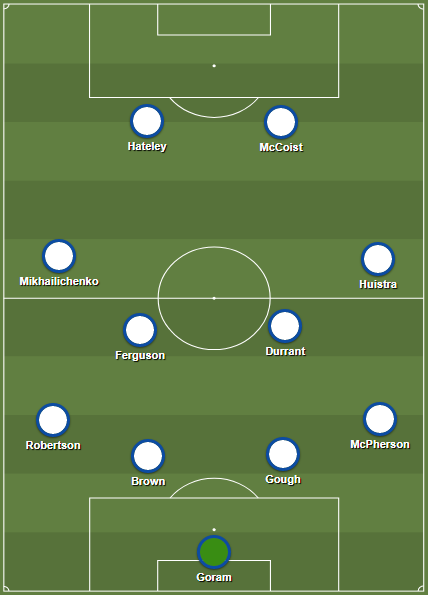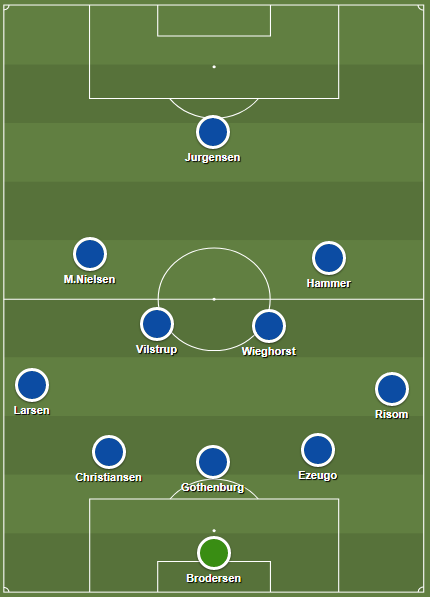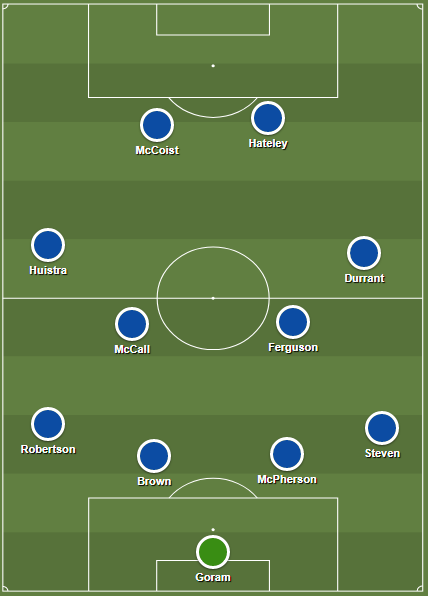The draw for the opening rounds of the Champions League would take place in Geneva, Switzerland on the 15th of July 1992, at which point Rangers learned of their 1st round opponents the Danish Champions Lyngby. With the match set to take place in mid-September Rangers would have to navigate no fewer than nine matches in August of 92, with a further two games in September sandwiched around an international break.
Appearing undaunted by this task, Rangers would kick off the new season in scintillating form. They began their league campaign with a 1-0 home win over St Johnstone, with none other than Ally McCoist scoring the winning goal. Rangers would welcome Airdrie to Ibrox the following midweek, a side they had overcome in the 1992 Scottish Cup Final, and would go on to repeat that scoreline with another 2-0 victory after goals from Mark Hateley and Dale Gordon. Rangers disappointment of a 0-0 draw with Hibs on Matchday 3 was quickly eradicated from memory after a resounding 5-0 win over Dumbarton at Ibrox in the 2nd round of the League Cup the following midweek. A Billy Dodds hattrick helped newly promoted Dundee record a shock 4-3 victory at Dens Park on the 15th of August, but Rangers followed that up with another 5-0 victory in the League Cup this time over Stranraer in the 3rd round.
The 22nd of August would see the first Old Firm match of the season, a match which would take place at Ibrox stadium. After a goalless first half Celtic would take the lead through a Gerry Crainey effort on the hour mark, but Ian Durrant would find an equalizer to give Rangers a point late in the game after finishing off a terrific passing move with a rifled strike into the top corner.
Rangers followed the Old Firm game with a trip to Tannadice, where they would overcome Dundee United 3-2 in the League Cup quarter-final. League play resumed the following Saturday with Rangers taking on another title contender in the shape of Aberdeen at Ibrox. Despite Aberdeen taking an early lead Rangers roared back to win the match 3-1, closing out what was a hectic opening month of the season.
Into September and Rangers would record two 4-1 victories in a row, firstly over Motherwell at Fir Park with McCoist grabbing a hattrick, and laterally over Partick Thistle at Fir Hill with four different Rangers players sharing the goals.
After 11 games in all competitions Rangers had scored a total of 31 goals and conceded only 10, with McCoist already into double figures (12 in 10 matches) it was already promising to be another terrific year in front of goal for both Rangers and their leading striker.
Rangers found themselves at the top of the table, with Hearts pushing forward as title contenders after Celtic and Aberdeen had made slow starts to the campaign.

Lyngby started the 92/93 season as reigning Danish Champions, a feat they had achieved only twice in their history, but by mid-September the wheels had begun to fall off Lyngby’s title defense rather quickly. Not only did they find themselves in 7th place of the Danish Superliagen they would also lose their Head Coach, Kent Karlsson, who had resigned after recording a solitary win in their opening 7 matches. Club officials would promote his assistant, Michael Scheafer, to lead the team moving forward a position he would stay in until 1995.
Lyngby’s final match before starting their Champions League campaign was far from an ideal performance, losing a 2-0 lead to draw 2-2 with Copenhagen.
Lyngby had a modest squad, even by standards of the time, with their summer transfer haul that was less than inspirational. The league winning side of 91/92 had included four players who were selected to represent Denmark at Euro 92, however after the tournament three would depart for pastures new. Henrik Larsen would return to Pisa in Serie B, Torben Frank departed for Lyon and Peter Nielsen moved to Borussia Monchengladbach. All that remained was Claus Christiansen, a center back that had made two appearances off the bench at Euro 92. Lyngby would replace these international level players with a smattering of Danish top tier journeymen, however their major recruitment came from their youth team, with players such as Morten Neilsen, Lars Hammer and Morten Weighorst now permanent fixtures in the starting eleven. Wieghorst trip to Scotland would be the precusor to a ten year stay in the country, with a transfer to Dundee coming shortly after this series of games, and a subsequent move to Celtic thereafter.

First Round First Leg
Rangers 2-0 Lyngby BK, September 16th 1992, Ibrox Stadium, Glasgow
Starting Line Ups
Rangers Line Up:
Stuart McCall would miss out on this match due to tonsillitis, leaving Smith with the fairly simple selection of placing Ian Durrant in a central midfield role next to Ian Ferguson.
The only major selection headache lay in which foreign players to list in the squad. Englishman Mark Hateley was a central figure to this Rangers side, so it was really only a question of which two others would join him. Trevor Steven was still working his way back to full fitness, as were Gary Stevens and Oleg Kuznetsov, and despite a positive start to the season Dale Gordon was overlooked in favor of Peter Huistra and Alexei Mikhailichenko.

Lyngby Starting Line Up:

First Half Tactical Analysis
Lyngby Tactical Framework
Clearly inspired by the tactical strategy employed by Richard Møller Nielsen with Denmark, Lyngby would set up in a conservative 5-4-1 defensive shape.
Lyngby’s defensive unit operated like a back five, however in Christiansen and Ezeugo Lyngby had two defenders with a willingness to step forward and defend that is probably unlike what we see today. They would frequently cover wide areas to assist the pressing actions of the wing backs (Larsen and Risom), as well as step out of the back line altogether to press a Rangers midfielder or a striker that had dropped deep.
This aggressive back line would stay close to the midfield forming a compact shape, yet they would allow Rangers central defenders time and space on the ball. When play progressed into the midfield, it was in these moments that Lyngby’s tight marking was in place to cause turnovers and then feed of the available space to counterattack to goal.
In Jurgensen they had a hard-working target forward that could link the play, but in Nielsen, Hammer and Wieghorst they had midfielder who could carry the ball forward and create attacks from distance.
In a match that many had predicted Rangers would dominate throughout, Lyngby certainly put up a good fight in the opening 45 minutes and tested Goram on multiple occasions.
Rangers Tactical Framework
By this point in Walter Smith’s reign as Rangers manager his 442 system was a fluid and functional machine. Despite the alterations made to the player pool in the summer, there is a comfortable familiarity to how Rangers operate as a side, with each attack looking like a well-rehearsed routine.
In Ally McCoist and Mark Hateley they have a partnership that can link up in a variety of different ways. The most prominent of which came from the aerial threat of Hatetely from goal kicks, linking up with McCoists creative movements off the ball. We also saw the duo exploit the spaces at the side of Lyngby’s back three, especially in transition when Lyngby wing backs are caught too far forward.
Rangers posed a major threat from wide areas, with Mikhailichenko and Huistra working well with their full backs to create mini overloads and find creative routes to goal.
Rangers would open the scoring on 39 minutes, when a wonderful piece of play on the left hand side was finished off by the head of Mark Hateley. Left center back John Brown creates the overload in this passage, carrying the ball forward before using his pace to advance and receive the ball back after making an underlap.
With Rangers now 1-0 ahead it served as vindication for their efforts in the opening 45 minutes, a half in which they had created multiple scoring opportunities. The target in the second half would have no doubt been to at least double that advantage, however the threat of an away goal must have weighed heavy on their minds given the way Rangers exited the tournament only a year earlier.
Second Half Tactical Analysis
Rangers made an aggressive start to the second half pinning back their opponents back, in large part, by the connectivity and creativity of Ian Durrant and Ian Ferguson in midfield. They managed to blend a solid defensive performance, breaking up play and pressing forward, with wonderful attack play that led to the creation of attacks on goal and for others.
Lyngby did open up more in the second half, with Risom and Larsen moving further forward to provide some much-needed attacking width. Rangers midfield dropped deeper to counter these wide attacking movements, which gave Ezeugo and Christiansen more space in which to carry the ball out from the back. This did begin to create more possession in the Rangers half, yet it failed to create anything meaningful in front of goal. As the pace of Lyngby’s possession reduced, the intensity of Rangers press increased, and on 67 minutes Durrant and Ferguson would lead the press in midfield resulting in a turnover that would lead to Pieter Huistra scoring the winning goal.
The match would finish 2-0 to Rangers, with the home side looking like a team that are resolute defensively and have multiple fronts on which to attack.
After the match Walter Smith was interviewed by Jock Brown for BBC Sportscene, in which he spoke positively about his side’s performance.
After Rangers 1st leg win over Lyngby they would return to league action to face 2nd placed Hearts at Ibrox three days later, recording a 2-0 victory with goals from McCoist and the returning Stuart McCall.
The following Wednesday evening Rangers faced St. Johnstone in the semi final of the League Cup at Hampden. McCoist would finish the match with his third hat-trick of the season, giving Rangers a 3-1 victory.
Rangers final match before travelling to face Lyngby in the 2nd leg was on paper a tricky away game against Dundee United at Tannadice. Rangers had narrowly beaten United earlier in the season in the League Cup, but in this match went into another gear altogether blowing away their opponents 4-0 with an impressive display.

Lyngby’s dismal domestic form didn’t appear to be arresting any time soon, as the weekend after their trip to Glasgow they would lose 2-0 to fellow mid table dwellers Brondby at home.
The following week they would travel to face top of the table Odense, in a match that would finish 0-0. The results from both games would see Lyngby drop a place in the table, now lying-in 8th position.

First Round Second Leg
Lyngby BK 0-1 Rangers, September 30th 1992, Lyngby Stadion, Lyngby
Starting Line Ups
Lyngby Line Up:
Nigerian defender Emeka Ezeugo would pick up an injury in the first leg at Ibrox, so would be replaced by youth academy product Thomas Rytter. Similarly Lars Hammer misses this match through injury, so in comes Allan Kuhn to play in the attacking midfield position.

Rangers Line Up:
The only notable changes are Mikhailichenko and Gough, the latter of which impacting the former. With Gough missing due to injury we would see Dave McPherson, a more natural center back, slide inside and Englishman Trevor Steven take up an attacking full back role. With Hateley taking his place up front this allowed one more foreign player selection, so given Huistra was in terrific form at this time he was selected ahead of Mikhailichenko. Durrant moved to a wide position, with the creative license to drift inside, allowing Trevor Steven to attack the wing.

Unfortunately, very little footage exists of this match, so all we have to go on is Rangers winning goal scored by Ian Durrant on 85 minutes.
With Lyngby throwing men forward in an attempt to claw back a goal, a clearance from the Rangers defence would fall to Ian Ferguson in midfield who turned to find Ian Durrant with a smart through pass. Durrant charged through on the keeper before applying a cool finish to see Rangers through 1-0 on the evening and 3-0 on aggregate.
Rangers were now through to the 2nd round of the Champions League, where they would take on the winners of Leeds United vs Stuggart.
Join us next time where we pick back up on October 21st 1992.


